- Interpretation Of Quran / The long version
- /
- (007) Al Araaf
Dear brothers, this is lesson number 2 of the interpretation of Surat Al-A'raf, and I will start with the second Ayah where Allah the Almighty says:
﴾And a great number of towns (their population) We destroyed (for their crimes). Our torment came upon them (suddenly) by night or while they were sleeping for their afternoon rest.﴿
Linguistic issues:
1- Use of the word "how":
Dear brothers, sometimes, in order to interpret the Ayat of the Quran, we need to know some rules in Arabic grammar. 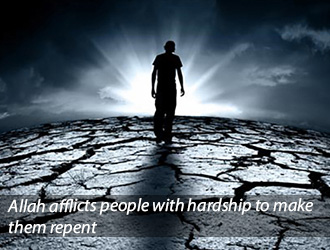 The Arabic word "Kam" (How) has two uses; the first one is as a question particle and the second one is as a reporting particle. If you ask, "How many books did you read?" and the man answers, "I read 5 books", how is an interrogative particle. However, if the man in front of me is someone who usually reads countless books and I ask him, "How many books do you read?", how is used as a reporting particle. Thus, if the answer of this particle is something that is countable, then it is an interrogative particle, but if it is uncountable, then it is a reporting particle.
The Arabic word "Kam" (How) has two uses; the first one is as a question particle and the second one is as a reporting particle. If you ask, "How many books did you read?" and the man answers, "I read 5 books", how is an interrogative particle. However, if the man in front of me is someone who usually reads countless books and I ask him, "How many books do you read?", how is used as a reporting particle. Thus, if the answer of this particle is something that is countable, then it is an interrogative particle, but if it is uncountable, then it is a reporting particle.
Allah the Almighty is the Lord of the Worlds, and He created man to grant him happiness in the worldly life and in the Hereafter, so if man goes astray from his course of happiness and safety, Allah will afflict him with calamities, so that he will return to Allah with repentance. I made it very clear in previous lectures that Allah the Almighty makes His servants repent, so that He would forgive them. The process is done through afflicting them with hardship which makes them repent, and when they repent to Allah, Allah will accept their repentance.
2- The figure of speech in the word "towns":
Allah the Almighty says:
﴾And a great number of towns (their population)﴿
In language, we have figures of speech, and in the following Ayah there is personification; Allah the Almighty says:
﴾ "And ask (the people of) the town ﴿
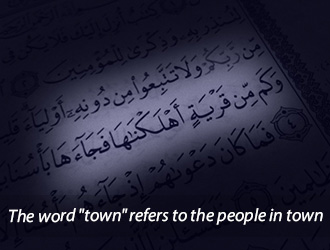 The town indicates a place, and it is inanimate, so it has no reason, and it cannot answer any question. However, in the Ayah, it is personified. . In our daily life, we say that the Chairs of Ministers met today, but is it logical to have the chairs met? Is it rational to have decisions made by the chairs? This is personification which refers to the ministers who sit on those chairs. In some figurative techniques in Arabic, we can indicate the owner of a place by mentioning the place, we can indicate the whole by mentioning the few, or we can indicate the few by mentioning the whole.
The town indicates a place, and it is inanimate, so it has no reason, and it cannot answer any question. However, in the Ayah, it is personified. . In our daily life, we say that the Chairs of Ministers met today, but is it logical to have the chairs met? Is it rational to have decisions made by the chairs? This is personification which refers to the ministers who sit on those chairs. In some figurative techniques in Arabic, we can indicate the owner of a place by mentioning the place, we can indicate the whole by mentioning the few, or we can indicate the few by mentioning the whole.
﴾ They thrust their fingers in their ears﴿
All the fingers cannot be thrust into the ear, so the fingers here indicate one finger only.
﴾ They thrust their fingers in their ears﴿
In Arabic language, the whole can be used in the metaphor to indicate part of it, and a part of the whole can also be mentioned to indicate the whole. The place is mentioned to indicate people who reside it, and so forth. This is a mental figure of speech. The metonymy on the other hand is a branch of a mental figure of speech.
Let me give you another example of personification in the following line of a poet's poem:
When death bursts its fingernails through bodies….
No spell will ever help
Death does not have fingernails, so here it is personification. The poet gave death a human attribute, so he did not mention man, but he used one of his attributes, or he gave death one of the characteristics of the monster, so he did not mention the monster clearly, but he kept what indicates him (bursting the claws or fingernails through flesh).
This is a very prolonged topic about the figurative style of writing. Allah the Almighty says:
﴾And a great number of towns (their population)﴿
Accordingly, the Ayah indicates the people of those towns whom were destroyed along with their towns.
"Our torment came upon them (suddenly) by night or while they were sleeping for their afternoon rest."
1- A remarkable indication in the Ayah:
Dear brothers, in the following Ayah there is a very precise hint that makes us wonder whether those towns were destroyed right away or not. Allah the Almighty says:
﴾ We destroyed (for their crimes). Our torment came upon them (suddenly) by night or while they were sleeping for their afternoon rest.﴿
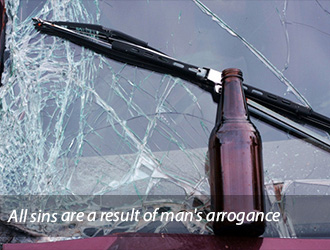 This indicates that they were not destroyed right away, so how can we see the consistency in the two meanings?
This indicates that they were not destroyed right away, so how can we see the consistency in the two meanings?
﴾ We destroyed (for their crimes).﴿
The verb "destroyed" is in the past tense. Allah the Almighty then says:
﴾ We destroyed (for their crimes). Our torment came upon them (suddenly) by night or while they were sleeping for their afternoon rest.﴿
I would like to give you an example to make this point clearer. If an employee is suspected to be misusing his career by blackmailing citizens and taking from them huge amounts of money whenever he wants to finish their paper work, people will gossip him. Some of them will say, "He takes money from people", and other people will say, "He asks for a bribe in order to do people's work (or to break the law)". Furthermore, doubts, fuss, unanswered questions, whispers, innuendo and rumors, will be spread about him. Consequently, the scandal will be out in public, so the administration has to investigate further. If they initiate a secret investigation by sending to this employee someone to pay him a bribe, and the employee takes the bribe, and if they send him another one to ask him to break the law, and he accepts and asks for a sum of money in return for his favors, a crucial decision should be made about him. In other words, after subtle, careful and long investigations, after listening to those who are with and those who are against him and after checking every solid or weak evidence, the administration convenes and discusses the situation of this employee, and if they unanimously decide to suspend this employee other measures will be taken. For instance, they will ask the secretary to write down the draft of this decision, then after signing the draft, it will be inserted in the computer and the final decision will be signed and propagated to all related departments. Finally, the decision will be issued to suspend this employee. In such a case, is the final decision swiftly issued? No, not at all! It is studied very well, and those who make it spend a lot of time studying it, so it is not issued out of sudden.
I have given you this example to make you believe beyond doubt that every disaster which befalls man does not come unexpectedly, it is not swiftly determined, and it is not befallen man randomly, but rather it befalls him for very profound wisdom. Allah afflicts man after giving him so many second chances (to repent), after watching him keep committing sins over and over again, after watching his arrogance which prevents him from repenting and after watching him boasting about his wrongdoings. Thus, after many warnings and many second chances, he may become righteous again, but if he refuses, the decision of destroying him is Divinely taken.
2- Every disaster is measured, and it happens for wisdom:
Beware of considering any disaster that befalls man something happens randomly, something happens out of sudden or something decided swiftly. The matter is more complicated than this.
﴾And a great number of towns (their population) We destroyed (for their crimes).﴿
 When you see a society indulged in Riba (usury), in adultery, in lies, in hypocrisy and in oppression, you should know for sure that this society is on its way to destruction, but when will that happen? No one knows.
When you see a society indulged in Riba (usury), in adultery, in lies, in hypocrisy and in oppression, you should know for sure that this society is on its way to destruction, but when will that happen? No one knows.
The main point is that when man turns away from Allah's Path and His Method, when he builds his glory on the wreck of others, his life on their death, his honor on their humiliation and his richness on their poverty, and when man is led by arrogance to (more) crime, refusing to listen to other people's advice which serves his best interest, and insisting on his pride, only then the Decision is taken by Allah to destroy him. However, Allah keeps this decision suspended, and when it is executed that will be due to great wisdom and accurate measures. Allah the Almighty says:
﴾And a great number of towns (their population) We destroyed (for their crimes). Our torment came upon them (suddenly)﴿
Accordingly, the destruction decision is Divinely taken, but executing it comes after a while.
One of the most delicate Du'as (supplications) is the following:
((O Allah, I am your servant, the son of your servant, the son of your maidservant. My forelock is in your hand, your command concerning me prevails, and your decision concerning me is just.))
((I seek refuge in the light of Your Countenance, by which all darkness is illuminated. And the things of this world and the next are rightly ordered that Your Anger does not fall on me, nor Your Displeasure descends on me. To you is all supplications until You are pleased. There is no power and no might except in You.))
Man suddenly might have a stroke which leaves him paralyzed, only this stroke does not happen out of the blue, but to the beholder it does look like that. Actually, if one lists all his sins and errors which reach a tipping point (without repentance from the sinner), the destruction decision is Divinely taken, so beware of judging the results.
3- The calamity is to deter, exalt, push to Allah, or destroy:
Disasters befall for many different reasons, so do not think that whoever has a stroke is a sinner.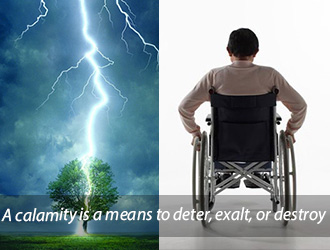 Hence, disasters happen to push man towards Allah, and these are the disasters of the believers, other disasters are meant to exalt man, and these disasters are the ones of the righteous people, so that they may exalt in the Sight of Allah. Some disasters are sent to deter the sinners, so that they may repent, while other disasters are means of destroying criminals.
Hence, disasters happen to push man towards Allah, and these are the disasters of the believers, other disasters are meant to exalt man, and these disasters are the ones of the righteous people, so that they may exalt in the Sight of Allah. Some disasters are sent to deter the sinners, so that they may repent, while other disasters are means of destroying criminals.
Finally, there are the disasters of the Prophets PBUT, and these disasters are meant to show people what Prophets PBUT are made of, for they manifest the perfection of the Prophets that cannot emerge but in hard conditions.
I repeat; Prophets PBUT were afflicted with hardships to show people their perfection, while believers are afflicted with hardships to be pushed to Allah the Almighty and to be exalted in rank. As for the sinners, they are afflicted with hardships to be deterred if there is still goodness in them, but if they insist on their errors and sins, and they determine to stay astray from Allah like the stray camel, they will be Divinely destroyed.
Sometimes, someone who is indulged in sins, errors, debauchery, corruption and adultery, is afflicted with a disease suddenly, and in this case we say that this calamity is Allah's immediate Nemesis, and it is depriving someone from his health and afflicting him with a disease. However, it is preceded by warnings, alarm, silent call, discipline, Ikram Istidraji (giving him graces to see if he thanks Allah or disbelieves in Him) and so many other tries.
 In other words, Allah the Almighty is Tolerant, and He gives the sinner graces, and He warns him, but when he insists on sinning, forgetting about his Lord and turning away from Him just like the camel turns away from its owner, only then he is afflicted with this disaster.
In other words, Allah the Almighty is Tolerant, and He gives the sinner graces, and He warns him, but when he insists on sinning, forgetting about his Lord and turning away from Him just like the camel turns away from its owner, only then he is afflicted with this disaster.
The most dangerous thing is when Allah takes a decision of destroying someone, and then He suspends this decision until He decrees to execute it. Then destruction comes suddenly, like when someone has an accident which leaves him paralyzed, or when Allah takes someone's wealth and leaves him nothing. We seek refuge with Allah from His sudden Nemesis and any change in His bestowed health and from His Wrath, to You is all supplications until You are pleased. I would, however, be much happier with Your mercy. I advise you to make this Du'a frequently. The Prophet PBUH said:
((O Allah, I am Your servant, the son of Your servant, the son of Your maidservant. My forelock is in Your Hand, Your command concerning me prevails, and Your Decision concerning me is just. I seek refuge in the Light of Your countenance, by which all darkness is illuminated. And the things of this world and the next are rightly ordered that Your anger does not fall on me, nor Your displeasure descends on me. To You is all supplications until You are pleased. There is no power and no might except in You.))
((Shaddad bin Aws (may Allah be pleased with him) said: The Prophet (PBUH) said, "The best supplication for seeking forgiveness (Syed-ul- Istighfar) is to say: 'Allahumma Anta Rabbi, la ilaha illa Anta, khalaqtani wa ana 'abduka, wa ana 'ala 'ahdika wa wa'dika mastata'tu, a'udhu bika min sharri ma sana'tu, abu'u laka bini'matika 'alayya, wa abu'u bidhanbi faghfir li, fa innahu la yaghfirudh-dhunuba illa Anta. (O Allah! You are my Rubb. There is no true god except You. You have created me, and I am Your slave, and I hold to Your Covenant as far as I can. I seek refuge in You from the evil of what I have done. I acknowledge the favours that You have bestowed upon me, and I confess my sins. Pardon me, for none but You has the power to pardon).' He who supplicates in these terms during the day with firm belief in it and dies on the same day (before the evening), he will be one of the dwellers of Jannah; and if anyone supplicates in these terms during the night with firm belief in it and dies before the morning, he will be one of the dwellers of Jannah."))
4- "Our torment came upon them (suddenly) by night":
I would like to get back to the Ayah:
﴾And a great number of towns (their population) We destroyed (for their crimes). Our torment came upon them (suddenly) by night or while they were sleeping for their afternoon rest.﴿
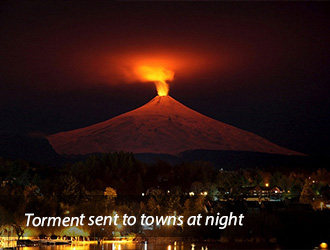 At night, man goes to his cozy bed in his comfortable house after he has his dinner, and everything is fine, but suddenly an earthquake turns the entire city (including his house) upside down. By Allah, I was told that the wife of someone from an Arab country was in dismay to such an extent that instead of holding her baby when she was rushing out of the house, she took her husband's shoe and left her baby inside the house when an earthquake hit his country.
At night, man goes to his cozy bed in his comfortable house after he has his dinner, and everything is fine, but suddenly an earthquake turns the entire city (including his house) upside down. By Allah, I was told that the wife of someone from an Arab country was in dismay to such an extent that instead of holding her baby when she was rushing out of the house, she took her husband's shoe and left her baby inside the house when an earthquake hit his country.

﴾ The Day you shall see it, every nursing mother will forget her nursling, and every pregnant one will drop her load, and you shall see mankind as in a drunken state, yet they will not be drunken, but severe will be the Torment of Allah.﴿
We hear from time to time about an earthquake here or a Tsunami there, and this is what happened to one of the most luxuriant costs in the world.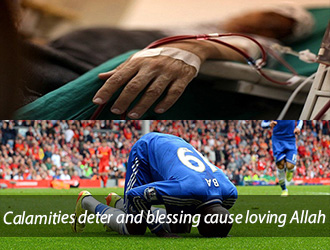 This cost used to attract the richest people at Christmas. Its climate is cool comparing with the chilly weather in Europe, so lots of rich people used to go to that spot which was considered a 10 star resort, only those rich people saw other kind of stars. They came to this cost to commit all sorts of sins like adultery, homosexuality and nudity. Suddenly an earthquake caused a destructive Tsunami which wrecked down everything there.
This cost used to attract the richest people at Christmas. Its climate is cool comparing with the chilly weather in Europe, so lots of rich people used to go to that spot which was considered a 10 star resort, only those rich people saw other kind of stars. They came to this cost to commit all sorts of sins like adultery, homosexuality and nudity. Suddenly an earthquake caused a destructive Tsunami which wrecked down everything there.
In another country, an island that was a resort for so many nudity clubs drowned entirely under water. Allah the Almighty says:
﴾And a great number of towns (their population) We destroyed (for their crimes).﴿
((The Messenger of Allah, peace be upon him, said: Dawud, peace be upon him, said to his Lord, "O my Lord! Who is most beloved to You among Your servants, so that I love him for the sake of Your Love?" He said, "O Dawud! The most beloved of My servants is the one whose heart and both the palms are pure. He never wrongs anyone, and he loves Me and My lovers and endear Me to My servants." Dawud said, "O my Lord! You know that I love You and love those who love You, but how shall I endear You to Your servants?" He said, "Remind them of my Graces, Boons and Afflictions."))
In order to acknowledge the health you are blessed with, go to any hospital, and you will see the patient who lost his leg, the one who suffers from a very scary skin disease, the one who has kidney failure or the one who has a stroke. I invoke Allah to keep us healthy.
The hardship is sometimes very useful (to man) due to its deterrent power (which brings man from the wrong path to Allah's Path), whereas graces are bestowed by Allah upon man to cast His love into man's heart. Concerning miracles in this universe, they make man glorify the Creator. It seems that the believer is supposed to glorify his Lord first, fear Him second and love Him third.
5- The town is the best place to live in:
Allah the Almighty says:
﴾And a great number of towns (their population) We destroyed (for their crimes). ﴿
 The indication here is that the town is the perfect place to dwell in. Some of the most powerful presidents in the world convened in Europe with so many sociologists and scientists in a resort for a month to find the answer of this question: Why does violence prevail in the world? Detailed answers were given, and I mentioned some of them in previous lectures, but most importantly, they pointed out that the big societies with huge population tend to be less socially disciplined, whereas small towns are more controlled. Thus, they recommended that every city should not have more than 200.000 people, because the cities whose population is 18 million people is a scary place to live in, for man will be estranged in such a place, and violence, crimes and fraud rates will be unimaginably high.
The indication here is that the town is the perfect place to dwell in. Some of the most powerful presidents in the world convened in Europe with so many sociologists and scientists in a resort for a month to find the answer of this question: Why does violence prevail in the world? Detailed answers were given, and I mentioned some of them in previous lectures, but most importantly, they pointed out that the big societies with huge population tend to be less socially disciplined, whereas small towns are more controlled. Thus, they recommended that every city should not have more than 200.000 people, because the cities whose population is 18 million people is a scary place to live in, for man will be estranged in such a place, and violence, crimes and fraud rates will be unimaginably high.
﴾And a great number of towns (their population) We destroyed (for their crimes). Our torment came upon them (suddenly) by night﴿
The torment came while they were asleep.
﴾Or while they were sleeping for their afternoon rest.﴿
The earthquake happened during their siesta.
6- Beware of Allah's Wrath:
Glory be to Allah, for His profound Wisdom, man who reached the moon, who sent unmanned spacecrafts to Jupiter and transmitted the event on air with colors and sound,  who invented submarines, who invented aircrafts and who invented destructive weapons, is still unable to have an early warning about earthquakes, not even one second before it happens. Unlike man, animals are able to predict earthquakes 20 minutes before they happen, and so they rarely die in earthquakes. They escape from the earthquake 20 minutes before it happens, so in one of the cities which were hit by the Tsunami earthquake, people followed the animals after watching them running away, and they survived.
who invented submarines, who invented aircrafts and who invented destructive weapons, is still unable to have an early warning about earthquakes, not even one second before it happens. Unlike man, animals are able to predict earthquakes 20 minutes before they happen, and so they rarely die in earthquakes. They escape from the earthquake 20 minutes before it happens, so in one of the cities which were hit by the Tsunami earthquake, people followed the animals after watching them running away, and they survived.
Allah's Torment might come at night, or at noon during the time of people's siesta. Therefore, whenever man noticed that Allah's graces keep coming though he often disobeys Him, he should be warned that Allah's Torment might come to him suddenly.
﴾ Verily, (O Muhammad PBUH) the Grip (Punishment) of your Lord is severe.﴿
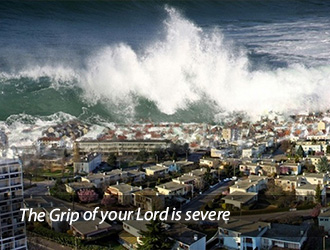 All of you watch earthquakes, floods, thunder storms and civil wars. Allah the Almighty says:
All of you watch earthquakes, floods, thunder storms and civil wars. Allah the Almighty says:
﴾ Say: "He has power to send torment on you from above﴿
This torment is thunder and missiles.
﴾ or from under your feet,﴿
This torment is earthquakes and mines.

﴾ Or to cover you with confusion in party strife, and make you to taste the violence of one another.﴿
﴾But severe will be the Torment of Allah.﴿
The Prophet PBUH said:
((Fearing Allah is the peak (or source) of wisdom))
7- Obeying Allah protects man from His Torment:
Bear in mind that when you obey Allah, you are included in His Care, Providence, Prosperity and Protection. The Prophet PBUH said: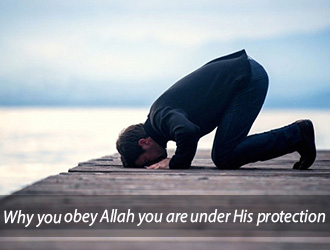
((He who offers the dawn (Fajr) in congregational Prayer will come under the Protection of Allah till the night, and he/she who offers night Salah (Isha'a) in congregational Prayer will come under the protection of Allah till the dawn))

((Jubair narrated from Abu Ad-Darda', or Abu Dharr, that: Allah's Messenger narrated that Allah, Blessed and Most High said: "Son of Adam: Perform four Rak'ah for Me in the beginning of the day it will suffice you for the latter part of it."))
When man offers night prayers, he recites the Quran and remembers Allah, and then he offers Fajr Salah in congregation, he is granted Allah's Protection, Prosperity, Guidance and Wisdom all day long, and he will be given special loftiness.
﴾And a great number of towns (their population) We destroyed (for their crimes). Our torment came upon them (suddenly) by night or while they were sleeping for their afternoon rest.﴿
﴾ No cry did they utter when Our Torment came upon them but this: "Verily, we were Zalimun (polytheists and wrong-doers, etc.)".﴿
Man is sufficient as a reckoner against his own self and confession is the mother of evidences:
What is the meaning of this Ayah? It means that man reacts in such a way:
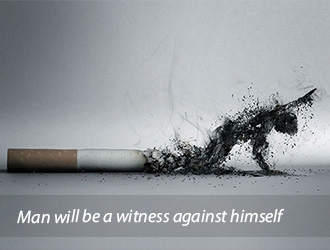
﴾ Nay! Man will be a witness against himself [as his body parts (skin, hands, legs, etc.) will speak about his deeds]* Though he may put forth his excuses (to cover his evil deeds).﴿

﴾ "By Allah, our Lord, we were not those who joined others in worship with Allah"* Look! How they lie against themselves! ﴿
This reminds me of a T.V commercial for cigarettes, featuring the iconic Marlboro cowboy who put jeans pants, astride a horse and had a cigarette in his hand, smoking it and saying, "Come to where the flavor is". What is this flavor? It is the flavor of wine, for the tobacco leaves are soaked in wine. This very man said before he died (of lung cancer), "I lied to you, because cigarettes are killing me." I repeat the Ayah:
﴾ Nay! Man will be a witness against himself [as his body parts (skin, hands, legs, etc.) will speak about his deeds]* Though he may put forth his excuses (to cover his evil deeds).﴿
When death comes, all facts will be disclosed:
I assure you that every person on earth without any exceptions, regardless of his religion, sect, orientation and School of Thought, and even if he is an atheist, when his hour of death comes, the truth, brought by Prophets PBUHT, will be revealed to him, and he will say:
and even if he is an atheist, when his hour of death comes, the truth, brought by Prophets PBUHT, will be revealed to him, and he will say:
﴾ "By Allah, our Lord, we were not those who joined others in worship with Allah."﴿
Is there a stronger evidence than this? When drowning overtook Fir'aun (Pharaoh), he said:
﴾ He said: "I believe that La ilaha illa (Huwa): (none has the right to be worshipped but) He," in Whom the Children of Israel believe, and I am one of the Muslims (those who submit to Allah's Will)."﴿
All people shall see the truth brought by the Prophets PBUT when the hour of death comes to each one of them. Allah the Almighty says:
﴾ Now We have removed your covering, and sharp is your sight this Day!"﴿
((It was narrated that Anas said: "During the night, the Muslims heard the Messenger of Allah standing and calling out at the well of badr; 'O Abu Jahl bin Hisham! O Shaaibh bin Rabiah! O 'Utbah bin Rabiah! O Umayyah bin Khalaf! Have you found what your Lord promised to be true? For I have found what my Lord promised me to be true.'))
They accused the Prophet PBUH of lying, while other people believed him, and they displaced him out of his town, while other people welcomed him warmly in their town.
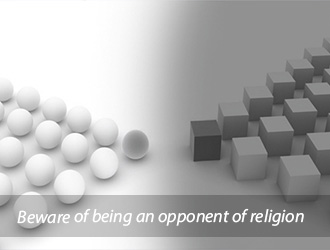 Beware of being an opponent of religion, and if you do so, then you have no idea Whom you are opposing. You are opposing the Lord of the Worlds. Hence, Allah the Almighty threatened two types of people with a war from Him in His Noble Quran and in the Sunnah by His Prophet PBUH. The first type of people is mentioned in the following Ayah:
Beware of being an opponent of religion, and if you do so, then you have no idea Whom you are opposing. You are opposing the Lord of the Worlds. Hence, Allah the Almighty threatened two types of people with a war from Him in His Noble Quran and in the Sunnah by His Prophet PBUH. The first type of people is mentioned in the following Ayah:
﴾ And if you do not do it, then take a notice of war from Allah and His Messenger﴿
Thus, a war by Allah is waged against those who eat usury. The second type of people is mentioned in the Prophetic Sunnah:
((Abu Hurairah (May Allah be pleased with him) reported: Messenger of Allah (PBUH) said, "Allah, the Exalted, has said: 'I will declare war against him who treats with hostility a pious worshipper of Mine.))
Allah the Almighty says:
﴾ No cry did they utter when Our Torment came upon them but this: "Verily, we were Zalimun (polytheists and wrong-doers, etc.)".﴿
[Al-A'raf, 5]
When do they (wrong doers) say so? They say so when it is too late.
Believing is a choice that should be made at the right moment:
Dear brothers, in life you have the chance either to accept or to refuse million decisions, but when it comes to believing, you have only one choice; you either believe at the right time, so that you can make use of that faith, or you believe when it is too late (after you see everything at the hour of death). Fir'aun is the fiercest disbeliever on earth isn't he? He once said:
﴾ "I am your lord, most high",﴿
 He also said:
He also said:
﴾ I know not that you have an ilah (a god) other than me﴿
However, when drowning overtook him, he said:
﴾ "I believe that La ilaha illa (Huwa): (none has the right to be worshipped but) He," in Whom the Children of Israel believe ﴿
Thus, your success lies in laughing at the end, because laughing at the beginning may cause you cry later on out of remorse, so who laughs last, laughs best.
﴾ And will return to his family in joy! ﴿
The one who laughs first is described in the following Ayah:
﴾ Verily, he was among his people in joy!﴿
He is corrupted, powerful and rich, and whenever he enters his house, he laughs like animals, whereas the believer fears Allah in the worldly life, and so Allah will give him what makes him laugh in the Hereafter.
﴾ But this Day (the Day of Resurrection) those who believe will laugh at the disbelievers﴿
"No cry did they utter when Our Torment came upon them but this":
What is torment?
﴾ No cry did they utter when Our Torment came upon them but this ﴿
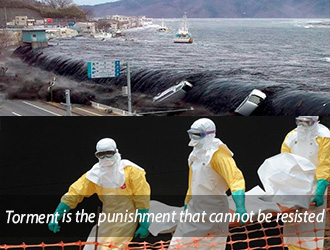 What is Torment? It is the overtaking punishment that cannot be resisted. Flue, for example, is a temporary disease which lasts for a week or so. The fraction in the bon is also something that can be cured after some time. In fact, there are hundreds of other diseases which can be cured quickly, but a disease like cancer is sometimes fatal, so are tumors, infarctions, strokes, kidney failure or liver cirrhoses. Similarly, the Divine Torment is a destructive power that cannot be fought back or resisted.
What is Torment? It is the overtaking punishment that cannot be resisted. Flue, for example, is a temporary disease which lasts for a week or so. The fraction in the bon is also something that can be cured after some time. In fact, there are hundreds of other diseases which can be cured quickly, but a disease like cancer is sometimes fatal, so are tumors, infarctions, strokes, kidney failure or liver cirrhoses. Similarly, the Divine Torment is a destructive power that cannot be fought back or resisted.
Tsunami left 5 million people homeless, and 300.000 people killed. Needless to say, the country which was hit by that Tsunami needs at least 10 years to recover the consequences. This is a Divine Torment, so it comes like natural disasters, intractable diseases or civil wars you hear and watch every day.
I met someone few days ago, and he swore to Allah and said, "I live 10 kilometers far from my parents' house, and the last time I visited them was few months ago. Had I visited them that day, I would have been dead (because of Tsunami)." Thank Allah the Almighty and ask Him to keep the graces of safety and security and to make them prevail in all Muslims' countries.
"Verily, we were Zalimun (polytheists and wrong-doers, etc.)"
1- You cannot fool people all the time:

﴾ No cry did they utter when Our Torment came upon them but this: "Verily, we were Zalimun (polytheists and wrong-doers, etc.)"﴿
 Due to your Fitrah, you can fool some people for a long time, or you can fool all people for a short time, but fooling all people for a long time is impossible. Nevertheless, man cannot fool himself or fool his Lord not even for one second, and this is impossible.
Due to your Fitrah, you can fool some people for a long time, or you can fool all people for a short time, but fooling all people for a long time is impossible. Nevertheless, man cannot fool himself or fool his Lord not even for one second, and this is impossible.
﴾Nay! Man will be a witness against himself [as his body parts (skin, hands, legs, etc.) will speak about his deeds]* Though he may put forth his excuses (to cover his evil deeds).﴿
2- Man manifests three personalities:
Dear brothers, man shows three personalities; the first one is known by all people, like his career as an engineer, a doctor or a teacher, or like some facts about him as being a white married person from Damascus. The second personality is the one who only the closed ones to him know, like his wife, children, neighbors, partner, the one who traveled with him and the one who dealt with him financially. The third and final personality is the one only Allah knows, and all problems lies in the third one.
 Man, for example, may propose to a woman and show that he is like an angel, but after marriage, he turns into a monster, and this is but the third personality he has. For this very reason, it is not preferable to praise someone without saying, "I assume he is good, and only Allah knows for sure." When our Master As-Siddeeq appointed Umar, may Allah be pleased with him, he said, "This is as far as I know about him O Lord, so if You ask me, 'Why did you appoint him as a governor?', I will say,
Man, for example, may propose to a woman and show that he is like an angel, but after marriage, he turns into a monster, and this is but the third personality he has. For this very reason, it is not preferable to praise someone without saying, "I assume he is good, and only Allah knows for sure." When our Master As-Siddeeq appointed Umar, may Allah be pleased with him, he said, "This is as far as I know about him O Lord, so if You ask me, 'Why did you appoint him as a governor?', I will say,
((Muhammad bin Sirin narrated from Abu Hurairah - and I think he (narrated it from the Prophet) who said: "Love your beloved moderately, perhaps he becomes hated to you someday. And hate whom you hate moderately, perhaps he becomes your beloved someday."))
Dear brothers, Allah the Almighty says:
﴾ Then surely, We shall question those (people) to whom it (the Book) was sent and verily, We shall question the Messengers.﴿
Then surely, We shall question those (people) to whom it (the Book) was sent and verily, We shall question the Messengers.
Refuting a doubt in this Ayah:
Finding the harmony between the following Ayat:
﴾ And no friend will ask of a friend,﴿
﴾ But the Mujrimun (criminals, disbelievers, polytheists, sinners, etc.) will not be questioned of their sins (because Allah knows them well, so they will be punished without account).﴿
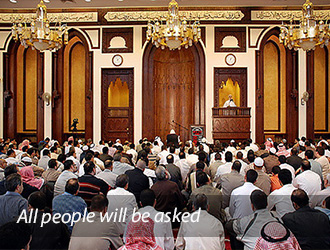 Someone once asked me about this Ayah, and I said to him, "If a man had a traffic ticket, then he committed a murder and was sentenced to death, it is meaningless to say while he is walking to his execution, 'Make him pay the traffic fine', because he is exempted from that ticket since he will be executed."
Someone once asked me about this Ayah, and I said to him, "If a man had a traffic ticket, then he committed a murder and was sentenced to death, it is meaningless to say while he is walking to his execution, 'Make him pay the traffic fine', because he is exempted from that ticket since he will be executed."

﴾ But the Mujrimun (criminals, disbelievers, polytheists, sinners, etc.) will not be questioned of their sins (because Allah knows them well, so they will be punished without account).﴿
﴾ So on that Day no question will be asked of man or jinn as to his sin, (because they have already been known from their faces either white or black).﴿
However, Allah the Almighty seems to be saying though, "I will ask those to whom I sent My Messengers, 'Did they respond to you? Did they believe in you? Did they disbelieve in you?' Then I will ask My Messengers, 'Did you convey My Message to them? Did you apply what you preach?'" The one who calls to Allah will be held accountable for everything he conveys to people, did he apply what he conveys to people? If he does not apply that, does he not feel ashamed? Do you not feel ashamed of something you order others to do, but you do not do it yourself?
﴾ Most hateful it is with Allah that you say that which you do not do.﴿
Thus, the preacher and the listener will be asked if they apply certain teachings and instructions or not.
Dear brothers, the infidels in the Prophetic era were disbelievers and on top of that, they were rude, for whenever they mistakenly thought that there might be contradiction in the Quran (the Quran is sublime above such assumptions), they would not keep silent since they were Arabs, and their language was Arabic at which they were very good.
The motive and the doer:
Allow me to elaborate the point by this example: if you say, "This student flunked his class", what exactly do you mean by that? You mean that he was lazy, and he deserved to flunk the year. Thus, only his laziness is the reason of his failure. On the other hand, what do you mean when you say, "The school administration made him flunk his year"? You mean that the administration made that decision, and such a decision needs someone to carry it out. Thus, when you ascribe the failure to the student, then he is the reason, but when you ascribe it to the administration, then it is the executive party, and the result is the same in both cases. Hence, there is no contradiction at all, because when you ascribe it to the student, the failure will be because of his laziness, and if you ascribe the failure to the principal, then you are denoting the decision made by him (which is based also on the laziness of this student). Accordingly, disasters are ascribed to man sometimes.
﴾ And whatever of misfortune befalls you, it is because of what your hands have earned.﴿
 Allah the Almighty says that you are the reason of this misfortune. In another Ayah, Allah the Almighty says:
Allah the Almighty says that you are the reason of this misfortune. In another Ayah, Allah the Almighty says:
﴾ Whatever of good reaches you, is from Allah,﴿
Definitely it is done by Allah, but it is caused by man. If An Arab man reads this Ayah, and he masters the Arabic language, he will not find any problem in understanding it, seeing it as just a different kind of phrasing.
Sometimes we denote the doer and in other times we denote the reason. As for Quraish infidels, whenever they sensed any contradiction, they would raise Hell against the Messenger PBUH.
Let me give you one more example about the meanings the words used to have in the past and they have changed at present. The Prophet PBUH said:
((O Allah, if You will (defeat Muslims [Isabah]), there will be none on the earth to worship You.))
"Isabah" means gang in English; in olden times it was a reference to the group of good people, but at present it means the gang of thieves or criminals.
In the following Ayah is an example about the different connotations of a word according to the era it is used. Allah the Almighty says:
﴾ and settled (Ista'marah) you therein﴿
"Ista'marah" is and Arabic word which means to settle down and carry out construction projects, but at present day it indicates those who invade other countries, despoil their treasures and kill their people, so it is a hateful word nowadays. When man is not very good at language, and tracking the evolutions of words is not of his interest, he may not understand some Ayat (which means that there is no contradiction, but he misunderstands the meanings due to his poor knowledge of language).
﴾ Then surely, We shall narrate unto them (their whole story) with knowledge, and indeed We were not absent.﴿
"Then surely, We shall narrate unto them (their whole story) with knowledge, and indeed We were not absent":
Their deeds will be told to them. Nowadays, showing someone a photo of him while he is breaking the law is the best evidence in investigations, and it makes man defenseless:
﴾ They said: "Our Lord! Verily! We fear lest he should hasten to punish us or lest he should transgress (all bounds against us)." He (Allah) said: "Fear not, verily! I am with you both, hearing and seeing.﴿
Allah the Almighty is with us.
﴾ Then surely, We shall narrate unto them (their whole story) with knowledge, and indeed We were not absent.﴿
﴾ And He is with you (by His Knowledge) wheresoever you may be.﴿
Allah is with the believers by His Prosperity, Triumph, Support and Protection.
Next lecture insha' Allah (if Allah wills), I will move to interpret the following Ayah:
﴾ And the weighing on that day (Day of Resurrection) will be the true (weighing) . So as for those whose scale (of good deeds) will be heavy, they will be the successful (by entering Paradise).﴿
Reviewed



